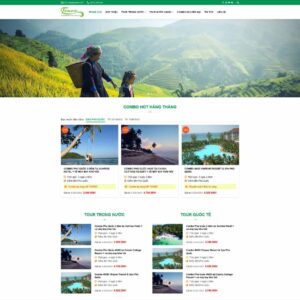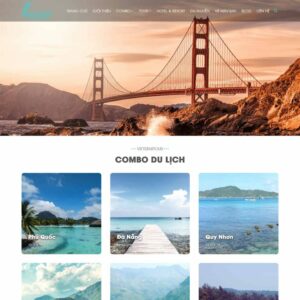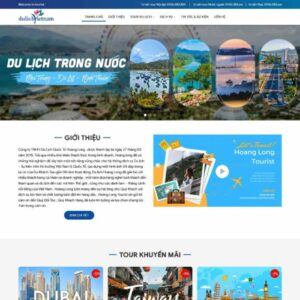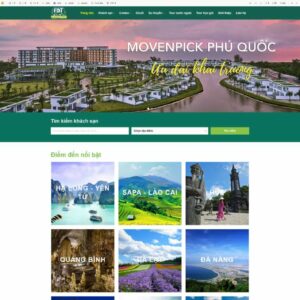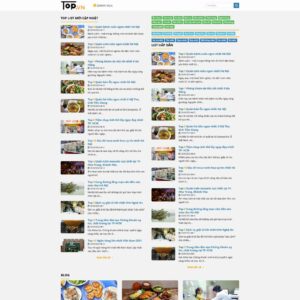
Explore the Travel 12 WordPress theme, the perfect solution for your travel website with many outstanding features, suitable for modern trends.
Explore the Travel 14 WordPress theme, the perfect choice for your travel website with beautiful design, user-friendly features, and ease of use.
Explore the Travel 16 WordPress theme with a stunning design and flexible features, perfect for travel websites, blogs, or news sites.
The Travel 19 WordPress theme offers beauty and perfect features, helping you create a vibrant travel website that connects adventure enthusiasts.
Explore a diverse range of WordPress Toplist Themes for Marketing Companies, Services, Travel, News, and many other fields, fostering creativity and growth.
1. Benefits of Designing a Professional Travel Website
In the travel industry, owning a professional website is an effective way for businesses to reach customers and quickly and visually introduce tours and services. An SEO-optimized travel website improves rankings on search engines, attracts potential customers, and increases conversion rates. Additionally, the website serves as the official information channel, where customers can easily learn about tours, highlight destinations, travel experiences, and book tours online.
2. Essential Features for a Travel Website
A travel website must integrate essential features to provide the best experience for customers. The interface should be user-friendly, easy to navigate, and optimized to meet the needs of customers searching for travel information and booking tours online.
2.1. User-Friendly Interface for Optimal Experience
The travel website interface should be simple, modern, yet professional. The colors should harmonize with travel images, utilizing beautiful, sharp pictures of destinations to attract customers. Call-to-action (CTA) buttons such as “Book Now” and “View Tour Details” should be prominently placed to encourage customer interaction, ensuring a convenient and professional shopping experience.
2.2. Detailed Tour Information System
The website should have a clearly categorized tour directory, such as: domestic tours, international tours, package tours, customizable tours, etc. Each tour should have a detailed information page that includes: tour introduction, itinerary, costs, images of attractions, cancellation policies, and essential notes. Providing comprehensive information helps customers gain an overview and easily make decisions when booking tours.
2.3. Integrated Online Tour Booking Feature
The online tour booking feature is essential for a travel website. Customers can easily book tours by filling out personal information, selecting departure dates, payment methods, and submitting booking requests. Integrating this feature not only creates convenience for customers but also helps businesses effectively manage tour schedules, thereby increasing conversion rates and enhancing service quality.
3. SEO-Friendly Design Process for Travel Websites
Designing an SEO-friendly travel website is crucial for businesses to reach potential customers and optimize business effectiveness. A standardized design process will create a good user experience and help the website rank highly on search engines.
3.1. Conceptualizing the Interface Design
The travel website interface should be designed to be modern and vibrant, featuring images and videos of destinations and tours. CTA buttons such as “Book Now” and “Learn More” should be placed in easily visible positions to encourage customer interaction. The website layout should be organized clearly, helping customers easily find information about tours and services.
3.2. Creating Quality Content
The content on the website should focus on providing detailed information about tours, sharing travel experiences, offering information about destinations, guiding visa procedures, and providing useful travel tips. Relevant keywords such as “travel website design” and “online tour booking” should be used naturally within the content to optimize SEO. Regularly updating content helps attract customers while enhancing the business’s credibility.
3.3. On-Page SEO Optimization
Optimize SEO elements such as title tags, meta descriptions, headings, URLs, and ALT tags for images. Use internal linking between tour information pages and travel experience articles to increase connectivity and assist customers in their information searches. Optimizing page load speed and user experience is also crucial for improving search engine rankings.
4. Modern Trends in Travel Website Design
Current trends in travel website design focus on user experience, integrating modern features, and optimizing interfaces.
4.1. Dynamic Interface Design Focused on Imagery
The travel website interface should be designed to be vibrant, featuring images and videos of travel destinations to inspire customers. High-quality, sharp images should be used to clearly showcase the beauty of each destination, helping customers gain a comprehensive overview and capturing their interest.
4.2. Integrated Tour Rating System
Integrating a rating and feedback system from customers helps create interaction and allows new customers to reference opinions before making decisions. A transparent rating system will increase credibility and encourage customers to book tours.
4.3. Mobile Optimization
The travel website should be compatible with all devices such as computers, phones, and tablets, allowing customers to access and book tours anytime, anywhere. This enhances user experience and increases the likelihood of reaching customers, especially those who frequently use mobile devices to search for travel information.
5. Choosing a Reputable Travel Website Design Agency
To own a professional travel website, businesses need to choose a reputable agency with experience in travel website design. This agency should provide comprehensive design, programming, and SEO optimization services, ensuring the website operates effectively, attracts customers, and enhances user experience.
Conclusion
Designing an SEO-friendly travel website is the optimal solution for businesses to reach potential customers, effectively promote tours, and enhance brand credibility. Invest in website design today to build a professional image and achieve sustainable growth in the travel industry.
Related Keywords:
- Travel website design
- Online tour booking
- Professional travel website
- Tour website design
